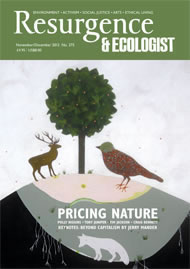To Uphold the World is much more than a scholarly re-examination of a legendary leader who extended his empire’s influence from Egypt to China. It is also a persuasive call for our own generation to challenge the central assumptions behind economic globalisation and replace them with policies grounded in an ethics of reverence and transcendence. If we attempt to do this much-needed work, the Dalai Lama writes in an afterword to this book, “To Uphold the World should serve as a source of great inspiration.”
Bruce Rich was moved to write his study of Ashoka after visiting the famous battlefield of Dhauli in Orissa, India, where hundreds of thousands perished during the annexation of the republic of Kalinga in 261 BCE. A well-known environmental lawyer and the author of Mortgaging the Earth, an insightful study of the World Bank, he was stunned to learn that after the slaughter at Dhauli, Ashoka renounced the primacy of force and wealth as the currency of empire in order to embrace policies based on veneration, compassion and nonviolence.
Rich suggests that re-examining the thinking behind Ashoka’s change of heart might allow our own generation to similarly reverse course. He believes this is necessary because champions of globalisation commit terrible violence by assuming that questions of global policy can be answered through first calculating their consequences and then following the ethic that the end justifies the means. This leads policymakers to tackle global problems with complicated institutional mechanisms powered by greed and fear, like the WTO and NATO.
Ashoka’s immense, multicultural empire was originally constructed upon a similar set of assumptions. The chief architect of the state Ashoka inherited had written a comprehensive manual of government in which he declared: “material wellbeing alone is supreme … for spiritual good and sensual pleasures depend upon material wellbeing”. As in today’s world, public policy was conducted through a combination of self-interest and coercion.
After the Kalinga War, Ashoka “attempted to transcend [this] view … through a new social ethic and politics of nonviolence and reverence for life”. In doing so he completely refashioned the traditional model upon which Indian kingship was based. Ashoka proclaimed performance of moral duty rooted in compassion as the primary value to be attempted by each member of his realm. Since people are deeply connected with each other and with every form of life, their social ethics must encourage them to create communities that “expand simply as an environment in which we may all engage in a common quest for the general good”.
Ashoka’s conviction that a spiritual centre lies at the heart of all human beings led him to endorse the search for truth, not systems of institutions, as the key to creating his secular version of an ideal Buddhist community. His essential doctrine was inscribed on pillars and symbolised through stupas raised throughout his long domain.
Ashoka’s doctrine taught welfare over warfare, redemption over punishment, universal healthcare for humans and animals alike, an environmental policy reflecting what we now call the principles of deep ecology, and a foreign policy based on nonviolence. His belief that truth is the only sure foundation for these goals also committed him to absolute freedom of conscience, “toleration for all religious and philosophical sects”.
Rich quotes Octavio Paz, a former Mexican ambassador to India, who was inspired by Ashoka to call for a recommitment to reverence for life as the keystone of our emerging global society: “We venerate the world around us and that veneration spreads to all things and living beings, to stones and trees and animals and humans … The ecological movement … insofar as it is a call to different social values, expresses our yearnings to participate.”
Rich concludes his homage to Ashoka by quoting the great Indian poet Tagore: “When the twentieth century was still young, Ashoka’s thought had been standing on the wayside for all these ages longing to find a refuge in the mind of every human being.” This moment may now be arriving.







